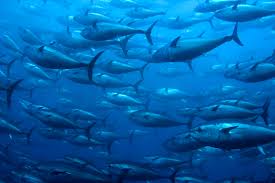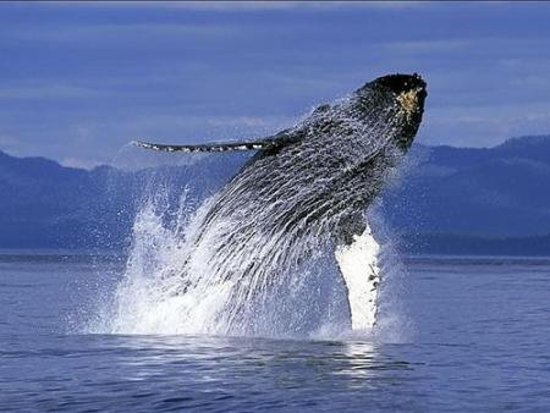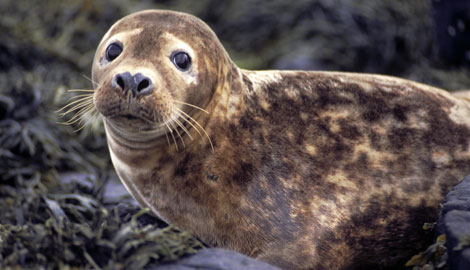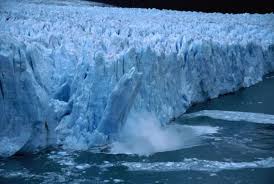1. 25% of the World’s Marine Life is Threatened with Extinction
Based off of conservation data for marine and non-marine organisms, almost 25% of the well known species in our oceans are now threatened with extinction. Dr Thomas Webb, a scientist at the University of Sheffield, states that: “Until now, there has been a general assumption that, despite pressures on marine environments like pollution and overfishing, marine species are unlikely to be threatened with extinction.” This study reports that there are just as many marine as non-marine species at risk. Read more…
2. Sharks Dance Their Way into the Hearts of America

This week if you hear the word ‘shark’ it is probably referring to the recent debut of the Katy Perry dancing sharks. We at Sea Save have seen sharks with lots of moves but, nothing quite like the ones we witnessed on the Super Bowl half time show! Traditionally, the media has depicted sharks as terrifying, bloodthirsty animals. In reality, sharks are victims to human activity. With the increase in shark fin soup demand, the population of sharks has greatly decreased impacting the entire marine ecosystem. The depiction of cute, friendly sharks was a refreshing tribute to reality.
Participate in our “Give ‘Em the Fin” campaign! The campaign is simple. Shark fans take photos of themselves, their family and their friends giving the international sign of the shark. With a few clicks, the images are uploaded to our site and incorporated into our mosaic. So, give ’em the fin and let’s keep the sharks dancing or maybe just swimming! Learn more about how to participate in “Give ‘Em the Fin” here…
3. Norway to Match EU on Climate Goals, Easing Oil Industry Fears

This week, the journal Environmental Toxicology and Chemistry, released a finding that the mercury levels in yellowfish tuna has risen 3.8% annually. More mercury has been introduced into the oceans with the increase in global industry. This study is the first to showcase comparative data on the mercury levels in fish over the last 50 years. Read more…
5. Southern Resident Killer Whale Included on the Endangered Listing
NOAA Fisheries passed a rule that Lolita, a captive killer whale currently residing at the Miami Seaquarium, will be included in the endangered listing status of her fellow Southern Resident Killer Whale population. Although Lolita will be included on this list, she will not necessarily return to the Pacific Northwest to be released into the wild. There are risks associated with releasing an animal that has lived in captivity for an extended period of time which could result in a tragic death. Read more…
A 15 foot shark was found washed up on the beach in the Philippines. The megamouth shark’s habitat is the deep ocean and is not generally seen by humans. Because of this, there is very little known about the behavior and habitat of this animal. Read more…
7. Will Genetic Modification Help The Great Barrier Reef Survive?

Over the last 30 years, around 50% of the coral coverage has decreased in the Great Barrier Reef. Scientists are now looking into a genetic modification process referred to as “assisted evolution”. This experiment will genetically cross coral from the central part of the Great Barrier Reef with the southern, colder areas of the reef.Read more…
8. Gotcha: Satellites Help Strip Seafood Pirates of their Booty

Do you know where your fish comes from? … beyond the grocery store or fish market. Most people have no idea where or how it was caught. Billions of dollars worth of fish is caught illegally every year. Illegal fishing occurs in areas that are considered protected marine environments or areas with overfished populations. Although many countries have put legislation in place, it is difficult to enforce. Now there is a new technology developed by SkyTruth to help monitor the ship activity in oceans. Read more…
9. Americans Say They Back Climate Action
10. The Icebergs Are Talking. We Just Have to Listen
“If a glacier cracks and nobody hears it, does it still make a sound?” Grant Deane, a researcher at the Scripps Institution of Oceanography, can answer that question. His team placed microphones underwater to determine the distinct sounds of the three types of calving. See the video of acoustic signatures against the video of the calving events. Watch here and read the published research paper here…
11. Dolphins Mourn Their Dead: More Evidence of Death Rituals
 A recent study reports that, similar to humans, dolphins also have rituals for a death in the pod. A team of Portuguese marine biologists reviewed two instances of Atlantic spotted dolphin mourning rituals. Many dolphin species have been recorded to carry or support the body of the deceased dolphin for extended periods of time. Read more…
A recent study reports that, similar to humans, dolphins also have rituals for a death in the pod. A team of Portuguese marine biologists reviewed two instances of Atlantic spotted dolphin mourning rituals. Many dolphin species have been recorded to carry or support the body of the deceased dolphin for extended periods of time. Read more…12. Haunting Songs Sung by Whales
 Before the discovery of the humpback songs in 1967 by Rodger Payne and Scott McVay, whales were considered massive monsters. By publicizing the songs, these biologists changed the public’s perception of whales and transformed these creatures into the gentle and soulful species that we recognize them as today. Interested in hearing the songs of humpbacks, bowheads, and other whales? Read more…
Before the discovery of the humpback songs in 1967 by Rodger Payne and Scott McVay, whales were considered massive monsters. By publicizing the songs, these biologists changed the public’s perception of whales and transformed these creatures into the gentle and soulful species that we recognize them as today. Interested in hearing the songs of humpbacks, bowheads, and other whales? Read more…
Be sure to “LIKE” http://facebook.com/SeaSave to ensure our “Week in Review” is delivered to your newsfeed every Thursday.










